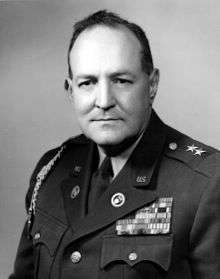Harry H. Vaughan
Harry Hawkins Vaughan (November 26, 1893 – May 20, 1981) was a senior officer of the United States Army Reserve, the Aide to the President of the United States from 1945 to 1953, the Aide to the Vice President of the United States in 1945, and one of President Harry S. Truman's closest advisors.[1]
Harry H. Vaughan | |
|---|---|
 Vaughan in uniform, c. 1946 | |
| Birth name | Harry Hawkins Vaughan |
| Born | November 26, 1893 Glasgow, Missouri, U.S. |
| Died | May 20, 1981 (aged 87) DeWitt Army Hospital, Fort Belvoir, Virginia, U.S. |
| Buried | (38°49′00.9″N 77°04′25.0″W) |
| Allegiance | |
| Service/ | |
| Years of service |
|
| Rank | |
| Unit |
|
| Battles/wars | World War I
|
| Awards | |
| Spouse(s) | Margaret Pilcher Vaughn |
| College football career | |
| Westminster Blue Jays | |
| Position | Center |
| Class | Junior |
| Major | Chemistry |
| Career history | |
| College | Westminster College (1912–1915) |
Early life and career
Harry Hawkins Vaughan was born on November 26, 1893 in Glasgow, Missouri. In 1916, he graduated from Westminster College in Fulton, Missouri. With the United States' entry into World War I, Vaughan was commissioned second lieutenant in the Field Artillery and was assigned for military training at Fort Sill, Oklahoma.[1]
During the training, Vaughan befriended another officer, future U.S. President Harry S. Truman. They were both assigned to the 129th Field Artillery Regiment within the 35th Division and sent to France. Vaughan participated in the Battle of Saint-Mihiel or the Meuse-Argonne Offensive. He served as a liaison officer and battery commander, and for his service in combat, he was later decorated with two Silver Stars and the French Croix de Guerre.[2]
Vaughan returned to active duty in World War II, was injured in a plane crash in 1943, and was assigned to the staff of the Truman Committee. Truman made him the first Vice Presidential military aide in 1945; he continued as military aide to the president when Truman succeeded Franklin D. Roosevelt, and remained in the post until the end of Truman's presidency in 1953.[3]
In the 1950s, Vaughan was accused of bribery. In 1951, White House Appointments Secretary Matthew J. Connelly asked legal counsel Max Lowenthal to help General Harry H. Vaughan in "setting up testimony."[4] Vaughan admitted repeated episodes of trading access to the White House for expensive gifts.[1]
Death
Vaughan died at Fort Belvoir, Virginia's DeWitt Army Hospital on May 21, 1981. He was buried at Ivy Hill Cemetery in Alexandria, Virginia.[1]
See also
References
- Harry H. Vaughan, Major General Who Was An Aide To Truman, Dies New York Times; May 22, 1981
- Harry S. Truman Library and Museum. "Harry H. Vaughan Papers". Retrieved May 26, 2014.
- Graff, Garrett M. (2017). Raven Rock: The Story of the U.S. Government's Secret Plan to Save Itself - While the Rest of Us Die. Simon & Schuster.
- "Oral History Interviews with Matthew J. Connelly". Harry S. Truman Library & Museum. November 30, 1967. Retrieved August 20, 2017.
Further reading
- Hamby, Alonzo (1995). Man of the people: a life of Harry S. Truman. pp. 302–3, 513, 585.
- McCullough, David (1992). Truman. pp. 365–66.
External links
| Wikimedia Commons has media related to Harry H. Vaughan. |
- Harry H. Vaughan at Find a Grave
- Works by or about Harry H. Vaughan in libraries (WorldCat catalog)